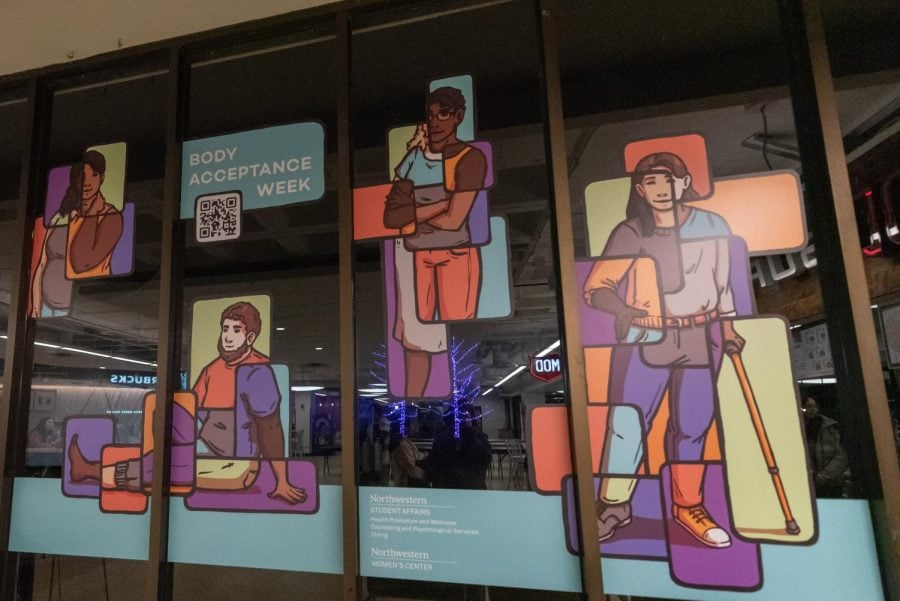Body Acceptance Week works to inform, provide resources on eating disorders and body image
Madison Bratley/Daily Senior Staffer
The Department of Health Promotion and Wellness placed graphics on a window on the ground floor of Norris University Center for Body Acceptance Week.
March 5, 2023
Content Warning: This article contains mentions of eating disorders and body dysmorphia.
Northwestern’s Body Acceptance Week, which ran from Feb. 27 to March 4, offered NU community members a combination of online resources and in-person events, ranging from an eating disorder panel watch party to a ballet class inclusive of all skill levels.
Sam Conway, assistant director of mental health promotion for the Department of Health Promotion and Wellness, coordinated with organizations like Eight Counts Ballet Company and Counseling and Psychological Services to plan the events and provide easy access to NU mental health resources, relevant articles and podcasts on HPaW’s website.
“One of the big values that I see of having this type of week on a college campus is just bringing awareness and resources to the forefront,” Conway said, “So that students, and people in general, know that it is, to some extent, normal and confusing to exist in your body in the world.”
HPaW posted educational content on their Instagram page throughout the week, including definitions of different body language philosophies, such as body positivity, liberation and neutrality.
Students also attended conversations and panels hosted by CAPS therapist and Eating Concerns Coordinator Fallon Weatherspoon and Campus Dietitian Maddy McDonough.
Conway said the wide range of events and online content was intended to “meet students where they’re at.”
“We know that Northwestern students, for better or for worse, can be extremely busy,” Conway said. “Variety really lets people choose how they want to engage, what they have time for and also come back to it later. It’s only a week-long event, but I leave that website up all year.”
Communication sophomore Brigid Reilly said she felt HPaW’s social media posts were important since many people aren’t familiar with appropriate language used to discuss eating disorders and body dysmorphia.
She also said she appreciated resources on HPaW’s website, which are applicable for the whole year, not just Body Acceptance Week.
“I just can’t help but think that a younger version of myself needed those (resources) so badly,” Reilly said. “I hope that the campaign this week gives people who maybe are in a position that I once was the resources to start to heal.”
Across campus, student groups also hosted events during Body Acceptance Week and National Eating Disorders Awareness Week. Eight Counts Ballet Company, NU’s premiere student-run ballet group, hosted a class Saturday with an emphasis on promoting body positivity and inclusion.
Black Health and Wellness Collaborative also held a workshop and guided painting exercise on Thursday, led by SESP sophomore and External Relations Advocate Michaiah Ligon.
“So many people were able to share their stories and their struggles with body image and it was really impactful,” Ligon said. “I wanted the dialogue to be open enough to where anyone could share what they wanted to share, but also, I wanted it to still be a space where people could learn if they didn’t want to share.”
Ligon said BWHC offers a safe space, which allowed participants to share their struggles, insecurities and self-care tips at the workshop.
While BWHC hosts workshops every Thursday, last week’s discussion focused on eating disorders, bodily autonomy and body appreciation and neutrality in BIPOC communities, according to Ligon.
“(Ages) 18 to 21 is such an iffy space in life, you’re trying to figure out who you are in multiple different capacities and what you want to be,” Ligon said. “The stressors of trying to get to a certain place can make you really look at yourself in a negative way.”
Both Ligon and Reilly said they felt Body Acceptance Week is especially important on a college campus, where disordered eating is likely to arise, worsen or resurface, according to the National Eating Disorders Association.
A 2013 NEDA study reported that between 10 and 20% of women and 4 to 10% of men in college suffer from an eating disorder — and rates are rising.
“College is really hard,” Reilly said. “Recovery in college is hard. Especially coming to college thinking I was recovered. I think that that is something that I was like, ‘Oh, this is a lifelong uphill battle.’”
Email: [email protected]
Twitter: @fionaroach03
Related Stories:
— NU Dining removes calorie counts from dining halls in response to research, student feedback
— Black Health and Wellness Collaborative offers space for discussion and support
— Health Promotion and Wellness aims to inform students about risks of CBD


